"I'm not afraid." But aren't you really?
Admitting that fear is a driving force in your life is the first step to turning it around.
Rhonda Britten shares this powerful message and gives tips (backed by neuroscience) on understanding and overcoming fear in this episode of SuperFastBusiness.
Podcast: Download (Duration: 33:43 — 34.6MB)
Get Notified Of Future Episodes Apple Podcasts | Spotify | Amazon Music | Android | Blubrry | Gaana | TuneIn | Deezer | Anghami | RSS | More
In this interview:
01:43 – From employee to entrepreneur
03:22 – Fear as a driving force
07:26 – Avoid the drama, avoid the victim mentality
11:19 – Emotional identification equals self-mastery
13:54 – Can you just park it?
15:23 – The Wheel of Fear and Wheel of Freedom
21:21 – Risk equals fear
24:29 – The roadmap to our future
31:07 – Rhonda’s message at SuperFastBusiness Live 2020
Find inspiration and practical help in your business journey inside JamesSchramko membership
Transcription:
James: James Schramko here. Welcome back to SuperFastBusiness.com. This is Episode 718. I’m chatting with Rhonda Britten who is a master life coach. Welcome, Rhonda.
Rhonda: Thank you, Mr. James. I’m so excited. 758, you’ve been around the block. You’ve been helping people for years. I’m so grateful to be here.
James: Yeah, about 10 years’ worth of podcasts here on SuperFastBusiness.com. And we’ve had a variety of guests talking about any number of topics. But I’m really excited to talk about this one because we’re going to be talking about fear. Of course, you’re from FearlessLiving.org. You’ve spent a whole lot of time helping people overcome fear. I’m not even sure if you use the word overcome, if you’ve changed that, because I’m sure you have a very unique process to how you deal with that phenomenon.
And you do spread your word from various platforms. You’ve had your own TV show, which is amazing. You had Starting Over, you won an Emmy Award for that. You’ve been on Oprah, more than once. So you’ve really hit the high notes in terms of how people have captured this message and the platforms you’ve been able to share it on. So we’re actually pretty lucky to have you here on SuperFastBusiness, the way I look at it.
Rhonda: Thank you, James.
From employee to entrepreneur
James: So where do we start with this topic? I guess I’ll relay a short story, and then that might sort of open things up for you. But I think for a few years after I left my last job, which was a general manager’s role in a really high-pressure environment, because I had young kids, had a mortgage to pay, I had a lot of bosses and pressure and spreadsheets and commission-only environment for many, many years.
When I left that to go into my own business, I think for a number of years, like many, many years, I still had flashbacks or nightmares of, you know, my worst nightmare is thinking I’m still working in a car dealership, but I can’t remember the name of the products. And I’m like, ‘Oh, really, I’ve got to go through all of this again?’ It’s like being pulled back. It took years for me to let go of the tension and the stress.
“A lot of entrepreneurs operate out of a significant place of fear.”
And I joke about this with some of our friends from the industry who I’m still in touch with, but we think it’s very similar to that Post Traumatic Stress Disorder, you know, we were in a real pressure cooker. And I think a lot of entrepreneurs operate out of, you know, a significant place of fear; they’re always just one month away from bankruptcy or social, you know, what do you call it when you’re pushed to the side and you’re pulled away, cast away?
Rhonda: Irrelevant. You’re irrelevant, you’re cast away.
James: Yeah, that’s it. They’re pushed to the side, they’re looked down upon, they’ve got people who depend on them to provide for them, obviously. And I think a lot of them are still making up for lost ground from lack of cuddles from their parents or being told they won’t amount to anything by their school teacher, you know, typical stories that you hear.
FEAR as a driving force
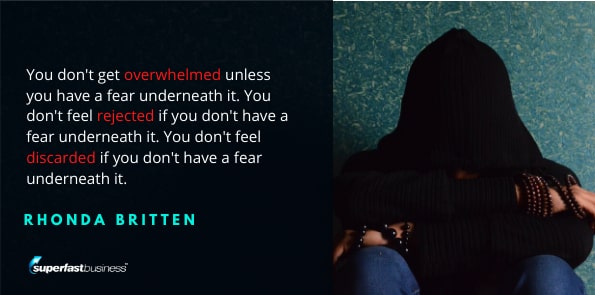 Rhonda: Well, I think that it’s a really important point that you’re making, is that I don’t know anybody that doesn’t have fear. And one of the things that people say to me on a regular basis is like, “Rhonda, I’m not afraid, I’m not afraid.” I go, “Yeah, I never use the word ‘I’m afraid’ or ‘I’m scared’ either. But I did have the results of being afraid, i.e. manipulation, defensiveness, perfectionism, anxiety, worry, comparing, competing, I could go on. And so all of these fear responses, whatever you think your problem is, is really a fear response. You don’t get overwhelmed unless you have a fear underneath it. You don’t feel rejected if you don’t have a fear underneath it. You don’t, you know, feel discarded if you don’t have a fear underneath it. So most people are not admitting that fear is a driving force in their life, which of course is the number one thing that could turn their life around and change their life, is if they just are willing, the first step is to even admit that they’ve got fear going on.
Rhonda: Well, I think that it’s a really important point that you’re making, is that I don’t know anybody that doesn’t have fear. And one of the things that people say to me on a regular basis is like, “Rhonda, I’m not afraid, I’m not afraid.” I go, “Yeah, I never use the word ‘I’m afraid’ or ‘I’m scared’ either. But I did have the results of being afraid, i.e. manipulation, defensiveness, perfectionism, anxiety, worry, comparing, competing, I could go on. And so all of these fear responses, whatever you think your problem is, is really a fear response. You don’t get overwhelmed unless you have a fear underneath it. You don’t feel rejected if you don’t have a fear underneath it. You don’t, you know, feel discarded if you don’t have a fear underneath it. So most people are not admitting that fear is a driving force in their life, which of course is the number one thing that could turn their life around and change their life, is if they just are willing, the first step is to even admit that they’ve got fear going on.
“The first step is to admit that you’ve got fear going on.”
So I like to say that anything you think your problem is, anything that you beat yourself up for, anything that you think, like, ‘Oh, this is a character weakness, if I only got good at this…’ That’s all fear responses. And so you don’t have a lot of problems. I used to think I had so many problems, right? Worry, perfectionism, etc. procrastination, right? So, I used to think there were so many things wrong with me. But when I started understanding how neuroscience works, and how fear really plays in and is part of our neurobiology, then everything changed for me. And all those things that used to drag me down – that negative self-talk, you know, that, ‘Oh, I’m not good enough.’ You know, again, whatever words you use to beat yourself up, put yourself down, compare yourself to others, those literally went away.
And I don’t know about you, but James, because when I have a clear head and I’m not being inundated with those negative self-talk, I actually can create. I can actually be bold in my decisions. I can actually do things that I’m called to do, rather than, I’ve got to do this because I’m desperate to do it, or I better do this or I’m screwed, right? We don’t want to live our lives like that. I know I don’t. And I come across the majority of people, and I don’t care if you’re an entrepreneur making, you know, $10 million, or an entrepreneur making $5,000. Right? It doesn’t matter. We all have these things that are driving our behavior. That’s actually one of the compelling reasons we do what we do, which is own our own business. We want to become masterful. But fear, it’s part of our neurobiology. It just keeps getting in the way and we blame ourselves for it.
James: Well, as you say that, it gave me memories of some of the bad bosses I had, who used to like, really put their thumb down on top of you and control you and make you scared. They used threats and so forth to try and motivate people. Like, it’s very common in the sales team, for example, like the worst performers are going to lose their job. They’re pretty much, they have to make a sale or they’re out. And they’re the ones who sweat and pester clients way over the top and act inappropriately or make false promises to just desperately grasp, grapple for that role.
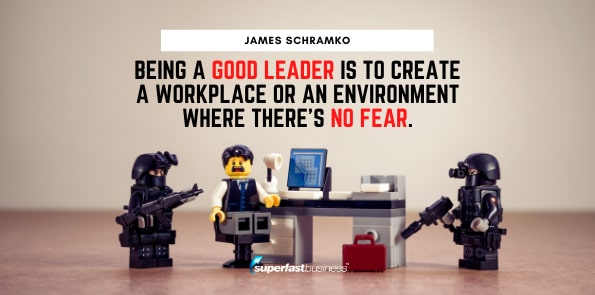 And I’m thinking about, as being a good leader is to create a workplace or an environment where there’s no fear, where it’s not always that constant threat, and then you do get that creativity. I think you’re absolutely right. I know I’m super creative when I’m doing positive, fun, happy things, like surfing for example, which I make sure I do every single day. And that just opens up the positive thing. It’s very easy with social media and news if you’re ever exposed to it, can be giving you the impression that you should be scared.
And I’m thinking about, as being a good leader is to create a workplace or an environment where there’s no fear, where it’s not always that constant threat, and then you do get that creativity. I think you’re absolutely right. I know I’m super creative when I’m doing positive, fun, happy things, like surfing for example, which I make sure I do every single day. And that just opens up the positive thing. It’s very easy with social media and news if you’re ever exposed to it, can be giving you the impression that you should be scared.
I mean, right now, like, amazing start to the year so far – we’ve had a global outbreak of a virus that’s killing people; we’ve had fires burning our country to the ground; we’ve got planes getting shot out of the sky; you’ve got the president of the biggest country in the world is impeached. I’m probably leaving out a couple, but there’s a lot going on in the news right now, and people are scared, but there’s so much positive to be happy for. Things can be brilliant. I mean, I just got fast internet hooked up yesterday. I was very excited about that.
Rhonda: Woohoo!
James: So, you know, there’s a lot of things to be excited for. And one thing I have noticed is when I’m out there in the waves on my board, all that stuff doesn’t matter. It doesn’t matter at all. The waves don’t care about bushfires or viruses or whatever. It’s just letting go of holding onto all of that stuff and feeling like you need to be involved.
Do you think sometimes people are actually compelled to place themselves in the line of drama? Like they keep watching the news, even though it’s making it bad for them?
Avoid the drama, avoid the victim mentality
Rhonda: Absolutely, absolutely. Because then it gives them an excuse. It gives them a way out. Oh, I can’t make a million dollars, because you see the economy right now? Oh, my God, I can’t do A, B or C, because of climate change, right? So we use the external environment. And by the way, our neurobiology does this automatically, we actually have to take our power back. But our neurobiology is wired to conserve energy. So what our body does is try to conserve energy. So we just repeat the same patterns over and over again.
Neuroscience now shows that the only way that you can truly change your life is by changing your filtering system. By changing the way you look at things. So just like you’re saying, ‘Okay, yeah, this sucks over here,’ and how can I use that to benefit me? So for instance, you mentioned our president, and, you know, I look at him and go, ‘Wow, he’s very emotionally and verbally abusive,’ you know, very emotional and verbal. I think anybody could agree with that. And so one of the things that I do is I go, ‘Okay, so how am I like that, you know? How do I emotionally abuse myself, verbally abuse myself? How do I accept it from others?’
You know, everything’s out there for us to grow, to change, to become more of who we’re meant to be. And the thing is that what we don’t understand is that our neurobiology actually is in charge of our decision-making if we don’t take it back. So like I said, let’s say that we’re 100 units of energy. Like, a hundred units, hundred units, and during that hundred units, I gotta conserve them. So the brain, what they’ve noticed is that actually the template we use to make decisions in our life when we’re unconscious, when we’re not awake, when we’re not present, like you said about when you’re surfing, right, you’re totally present, is it just repeats the past because all fear cares about is keeping you alive, it doesn’t care about your happiness, it doesn’t care what your bank account says. It only wants to keep you alive. So it will have you repeat patterns over and over and over again. So they might look like a different person, but it’s a similar outcome.
“Fear is smarter than you are, more educated than you are, knows everything you know.”
So our neurobiology has us wired that way. Also, our neurobiology doesn’t know the difference between an emotional fear and a physical fear. So you’re talking about going surfing; some people might be like, ‘Oh my god, I’d be so scared to do that.’ Right? And yet, most people admit their physical fears, but they won’t admit or aren’t even aware of their emotional fears. So that fear of rejection, fear of loss, fear of failure, fear of success, etc. And the body and brain and the way we work doesn’t know the difference. So you, wanting to increase your income by three, or wanting to open your own business, is going to bring up emotional fears. And unless you see them for what they are, they will trick you. Because fear is smarter than you are, more educated than you are, knows everything you know, so it will use anything to get you to stop because it loves you. It wants to keep you safe. So it will do anything to do that.
“Fear will always win if we don’t actually make a different choice.”
So the way our neurobiology works is that fear will win, always, if we don’t actually make a different choice. And making a different choice will actually bring up all those fears. And we have to be able to see the fears for what they are, right? We just have to be able to see them for what they are so we don’t get caught in them and believe them. So when people say, you know, I’m not good enough. It’s like, Really? Are you making that up, or is that a fact? And people build evidence to prove that. And it’s like, well, do you want to keep building evidence to prove that? Or do you want to think differently about yourself?
“You’re a victim of your own emotional thoughts, feelings, and body sensations.”
So we have so much power, but like you said, the tragedies of the world, the fears in the world, come down upon us, and we actually think we’re victims of that. So even though we’re doing the best we can, so many of us are actually living in a victim mentality. Now, I know none of us want to believe that. But it’s actually true, right? You’re a victim of your own emotional thoughts, feelings, body sensations. So you get to decide, and that takes courage. That takes willingness and you’ve got to see your whole life differently.
James: Wow. That’s pretty profound stuff. And I’m just wondering, why aren’t we hearing about this stuff at school? Like, we’ve learned to put our seatbelt on, we’re told we shouldn’t smoke, we should check left and right before we cross the road. So we’ve got a lot of things around that physical fear and danger. But we don’t get taught much about emotions, it seems.
Emotional identification equals self-mastery
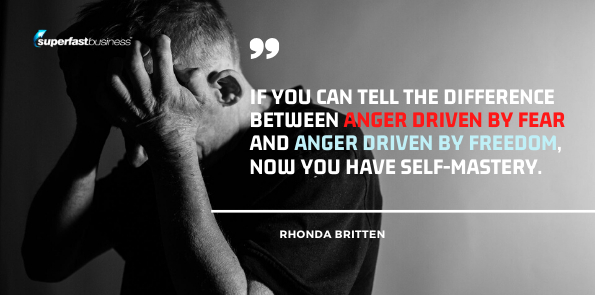 Rhonda: Well, I think it’s also the adults, right, because they don’t know emotions. I mean, one of the first things that I do with clients is just get out a feelings list and start talking about feelings. And you know, most people have comfortable two to four feelings. I’m angry, I’m depressed, I’m sad, you know, I’m frustrated. Maybe I’m happy, right? And they kind of bounce around all those feelings. Well, also neuroscience has told us that the more emotional intelligence we have, the more we can define feelings, the larger our vocabulary is, in defining feelings, the more that we actually have our life back. So when you only have two or three feelings, you’re going to be at the effect of those. But if you have 100 feelings, 200 feelings, so you can tell the difference between frustrated and irritated, if you can tell the difference between anger driven by fear and anger driven by freedom, now you have self-mastery; now you have self-regulation; now you can take your life back, and now you can decide you won’t be tricked, right?
Rhonda: Well, I think it’s also the adults, right, because they don’t know emotions. I mean, one of the first things that I do with clients is just get out a feelings list and start talking about feelings. And you know, most people have comfortable two to four feelings. I’m angry, I’m depressed, I’m sad, you know, I’m frustrated. Maybe I’m happy, right? And they kind of bounce around all those feelings. Well, also neuroscience has told us that the more emotional intelligence we have, the more we can define feelings, the larger our vocabulary is, in defining feelings, the more that we actually have our life back. So when you only have two or three feelings, you’re going to be at the effect of those. But if you have 100 feelings, 200 feelings, so you can tell the difference between frustrated and irritated, if you can tell the difference between anger driven by fear and anger driven by freedom, now you have self-mastery; now you have self-regulation; now you can take your life back, and now you can decide you won’t be tricked, right?
But we’re not taught that, just like you said. We’re not taught that because I think the adults in the world don’t understand it themselves. And everybody has beaten themselves up and been told that it’s their fault, right? Like, oh, you’re lazy. You’re stupid. You’re A, B and C. And it’s like, no, you’re not stupid. And no, you’re not lazy. You’re not any of those things. It’s just that fear has kind of purchased you, and you’ve bought in and believed it.
So most people don’t understand that the things that they say to themselves, beat themselves up by, their quote-unquote negative beliefs, are just some symptoms of fear. It’s nothing else. But it’s hard when it feels so overwhelming, right? When it feels like it’s true. And we want to start separating that truth from fact, right? We want to know what the fact is rather than the feeling of truth. I mean, this is where so many of the law of attraction kind of gets it wrong, right? Law of attraction works to a certain extent, but over here, uh-uh, it’s going to keep you stuck in fear over and over again.
James: Yeah, but I’ve recently had a guest on that topic. And I know the law of attraction seems pretty simple. You want something, you go get it. That’s my understanding of how things actually work. And I sort of have a laugh about it, but it seems that what I’ve noticed as I’ve changed my routine and let go of the way we’re told to do things, I have let go of doing a nine-to-five Monday to Friday, I’ve let go of having to work in someone else’s business and doing what I’m told. I’ve got that space. Up until I had my recent baby, I had very, very, very good sleep. And we start to be able to catch things as they’re coming through our mind and stop, question everything and recalibrate. And then I studied some guys like Adler and his philosophy, and he says, look, people only have trauma because they choose to repeat it and bring it back into the future. You could pretty much just park it if you want.
Rhonda: Yeah, well, I think that’s true and false, right? If you don’t see it as trauma, you can’t park it.
James: Right.
Can you just park it?
Rhonda: So if you believe it’s true about you, and you’ve been told it’s true about you, you can’t park it. So that’s the thing. It’s like, you know, one of the things that I always talk about in Fearless Living is the amount of gentleness, compassion, and innocence you must have in order to truly change your life. So being hard on yourself, telling yourself, “Willpower, come on!” that actually isn’t going to get you where you want to go. And I love that you brought up the word space because space is so critical for us. You know, the space in between being told something or think something, and the space in between what you want to do with that thought or that feeling.
And most of us like I said, you know, we’re just on autopilot, and we have a feeling and we believe it, and then we act that feeling out. Oh, nobody loves me, right? I’m never going to get this. I keep on failing. And you actually believe it. Even though on one level, you’re trying to make sure it doesn’t happen, but still, you subtly keep on believing it and keep perpetuating that. So yeah, sure, if you’re awake and aware, you can park it. But most people I know are not awake and aware. And they don’t know how to park it.
I always say like, you know, when I would read books when I was messed up and screwed up and going through my tragedy in life, you know, I’d read a book and it said, “Love yourself,” and I’d be like, well, if I knew how to love myself, I’d do it. So it’s not helpful to tell somebody, “Just love yourself,” or it’s not helpful to go, you know, just park it. That’s not helpful when they’re really in the midst of it. They don’t know how to get from, ‘Okay, I know I’m supposed to be able to park it, but then how do I park it?’ And that’s where fearless living comes in.
The Wheel of Fear and Wheel of Freedom
That’s why I created something called the Wheel of Fear and Wheel of Freedom. So you know how you operate at every minute. And I think once you understand what your core fear is, what’s driving you at the very core of who you are, it no longer tricks you. You no longer buy-in. You actually see it.
And then the Wheel of Freedom, what I do is help you discover your wheel of freedom, which is that part of you that you’ve left behind. By the time you were five, our wheel of fear and wheel of freedom was born, you know, is locked down. So that wheel of freedom, we want to be able to access that authenticity, you know, beauty, gentleness, innocence, etc. Yours is probably different than mine. Everybody is unique and personalized. So, you know, we want to be able to identify our own individual fear so that we can see it. So we do have the space to make a different decision. And then with the wheel of freedom, you know exactly what to do. So there is that how peace. Like, how? Well, let me show you. Let me show you how.
I mean, I was just talking to an entrepreneur, and I did his wheels for him, his wheel of fear and wheel of freedom. And this is the response I get all the time: “Oh, my God, it blows my mind. I can’t believe this. This is so true. This is why I’ve been stuck here.” And he went on. He now has, within weeks of working with me, he now has, like, the number one creativity podcast, number two business podcast. And he wasn’t doing any of this when we had our session. He was just kind of floundering, working for other people. And he didn’t know where he fit in. But the minute he got his wheels, he’s like, ‘Oh, that’s why I’m not doing A, B and C. That’s why I keep getting stopped.’ And so, he is, like, literally I think I did his wheels, let’s just say, I want to say, October maybe. And it’s now, you know, just a few months later and he’s on fire.
And that’s what happens. I had another client who, you know, made 150,000. And within one year, she was making 1.5. Because, again, you’re not going to believe the lies fear tells you anymore.
James: Right. A few examples where space can really help. When I was teaching salespeople, I would teach them the pause. And that’s where they didn’t have to immediately respond to the customer’s stimulus. They could actually stop, process it, see what they’re really asking or what the correct solution is, and then proceed in a more structured way. And the other example that I heard Ed Dale actually talking about was when he was posting to social media, or whatever. He was using a scratchpad, where he would put the post to a blank document first, and then he would go back later and then edit it and then he’d post it, so there was a delay process.
We applied the same thing to our production line for content. When we have a podcast like this, it gets put into a “for approval” channel. And then it gets picked up and then published. So we all have time to digest it. And I really have applied that to myself when I came up with Work Less Make More book in collaboration with Kelly Exeter. The whole point of that was to help people find back that time, and then you can do that introspection. Because I agree with you, and it’s like, at least a quarter of what I teach my students. It’s back to yourself – self-effectiveness. We are most likely the single biggest constraint to our future of any possible scenario. Like, nothing external until you get that internal.
And to your point earlier about, you know, you can’t do this because of the market or you can’t do that because of the politicians. Well, in any market in any environment, there’s always someone doing well and high-performing, and they haven’t bought into the lie. They’ve probably got a better handle on knowing themselves.
Rhonda: That’s right. I mean, think of 9/11. You know, I just done flying from Cancun, Mexico, right? And, you know, every single thing is charged. Your bag’s charged. Your seat is upgraded, right? Like every single thing. 9/11 was horrific and horrible for the United States of America. But it was really great for airlines.
James: Right. And why is that?
Rhonda: Right, because it’s just like, it allowed them to nickel and dime us, right? It allowed them to increase their prices. It allowed them to charge baggage fees, right? It allowed them to take the weight of the baggage from 75 to 50. Right? It gave them full permission to do whatever they were compelled to do, because it’s like, well, now, hey, we have full permission.
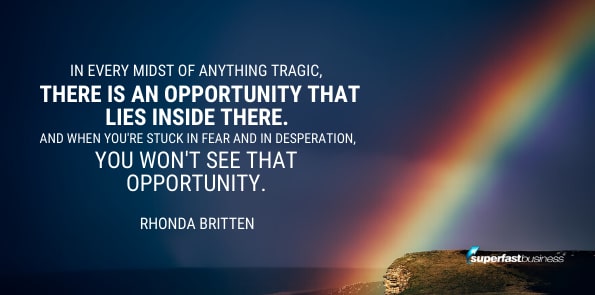 So, you know, you’re absolutely right. In every midst of anything tragic, hard, uncomfortable, you’re not sure what to do, there is an opportunity that lies inside there. And when you’re stuck in fear and in desperation, you won’t see that opportunity. You will be blinded to it. Because you’re just now making a desperate decision.
So, you know, you’re absolutely right. In every midst of anything tragic, hard, uncomfortable, you’re not sure what to do, there is an opportunity that lies inside there. And when you’re stuck in fear and in desperation, you won’t see that opportunity. You will be blinded to it. Because you’re just now making a desperate decision.
“Be okay with yes and be okay with no.”
And you know, one of my philosophies is, if I feel desperate, because that’s one of the things that happens to me on my wheel of fear, I start feeling desperate. And when I feel desperate, I know – do not act! Right? Do not act! Do not make a decision! Because it will be bad, right? I have to get centered, I have to get awake, I have to get aware, I have to be okay with yes and no. I have a chapter in my book, Fearless Living – if you can’t say no, your yes means nothing, right? If you can’t say no, your yes means nothing. So I train my clients to, anytime they want to make a decision, they have to be okay with yes and okay with no. Because then the clarity comes forth, and you can actually make the right choice for you. The best choice for you. But most people are, you know, driving on that wheel of fear and don’t even know it, and are just trying to move fast, and etc., etc. I know that was me most of my life.
James: Well, I’m lucky my grandma taught me when she was teaching me to paint; she said you can’t have light without shade. And I really understood that all the challenges, all the difficult things, when we had a little financial dip as a family when I was a kid, but when there was a recession, like the last time was a real recession, and a lot of people listening to this one have ever seen a recession. That’s what helped me become who I am now. Because I think a lot of the things I do, and I’m conscious of this, building secure footholds and bases, like, financial strongholds, is really making sure that that was a one-time thing and not a repeat thing. I don’t want that cycle to repeat.
It’s the same as a parent. I feel a huge responsibility to my kids to be the best parent I can because they’re likely to repeat the cycle of how I parent them. As you know, a lot of prison systems probably have generational disadvantages, people who are repeating bad processes are in society. So that’s a really fascinating insight. For every hardship, for every difficult thing, there’s an opportunity. And if you’re in a place where fear’s got you by the balls or, if it’s got a stranglehold on you, then that must mean that there is a really joyous and amazing possible path on the other side of that, right? That’s the opportunity.
Risk equals fear
Rhonda: You wouldn’t be afraid. Your fear wouldn’t be coming up if you weren’t on the verge of taking a risk. Right? If you’re sitting on your couch eating Doritos, fear doesn’t have to visit you. You’re doing fine yourself. You got yourself locked down and doing nothing. But you think of a new idea, right? You think of, could I? Maybe I should ask this person. Well, what if I started this? Like, even a new thought, which is, you know, I always say this to people. It’s not just the action you take. It’s a new thought. You have a new thought. You haven’t made a million dollars yet, and you are like, ‘Oh my god, I’m making, you know, $50,000 a month. I could actually do it.’ Like, that new thought actually brings up risk. And fear goes, ‘Well, something bad’s going to happen if he or she does this, I gotta shut them down and have them repeat the past,’ right?
So that is the thing, like, just to know that if your fear is up, a fear of rejection’s up, a fear of failure’s up, fear of success, etc, then you are on the verge of taking a risk or thinking about a risk. So there’s a big opportunity for you. And you’re just getting caught in the wrong filter, right? You’re getting caught in the wrong thing. So I always say, you know, every feeling, every value can be used in service to fear or freedom.
So integrity, everybody loves to be called integrous. Right? If somebody called you, that James has so much integrity, it’s like, Yes, I do, right? But integrity in freedom means you can renegotiate. It means you can change your mind. Integrity, when driven by fear, is you can’t change your mind. You said you were going to do it 20 years ago, gosh, darn, you’re going to do it, right? So there’s no flexibility. There’s no open-mindedness. There’s just the rigidity. So, you know, every feeling and every value is used for fear of freedom. So it doesn’t matter if you’re angry. It’s like, well, are you using anger in service to fear, or anger in service to freedom?
Oh wait, what about the value of integrity, like I said, or the value of love? People always say, “Oh Rhonda, well, there’s two emotions, fear, and love.” I’m like, Yes. The problem is, is that so many of us attempt to love from a fear-based place and be people-pleasers, become Yes people. So yes, you’re being loving, but you’re not actually including yourself in the love. You’re just doing what you think is loving for them, but it doesn’t include you. So all feelings and all values actually are in service, either fear or freedom. So just saying the feeling or just having the value isn’t enough. You actually have to challenge yourself and ask yourself, okay, what’s driving this? What is driving this feeling? What’s driving this value? Because just saying you have integrity is not enough, because you might be really rigid, and that’s driven by fear.
James: It’s like some entrepreneurs are really driven by childhood experiences where they had lacked, or they were teased, and they’re going to show the world, and they’re going to conquer and dominate. And this carries on as a full-grown adult with kids and everything, even to the detriment of their family. And I think it’s fascinating.
The roadmap to our future
So what I’m hearing is, the roadmap to our future is really contained within us. And it’s about creating some space to actually sit back, reflect, and if basically, if we were to process things very quickly, if we could just expand that processing time and have time to, you know, sift out the wood chips and just find the real ideas, get the signal, not the noise, then we’re going to operate with a better future because we’re now processing things in a smarter way.
Rhonda: Exactly. And you know, again, this is my work, Fearless Living, is doing that is yes, absolutely, one hundred percent, yes, yes, yes. And for me, until I understood the fear driving me, those strategies would just be changing chairs on the Titanic. It wasn’t actually coming from my highest and best, right? I think of a client that I had, an entrepreneur. We were in a mastermind, and he said exactly what you said a minute ago. He said, “I am sick of making a million dollars, losing a million dollars; making $3 million, losing $3 million. I’m so sick of it.” And so I asked him about his mother and his father, etc. And he goes, “Oh, this is exactly like my grandfather and my father, and I want to quit doing that.” And I said, “Okay, so your grandfather one loss, one loss. Father, one loss, one loss. You now are one loss, one loss.” I go, “That’s called belonging. That’s called belonging; you belong now.” And belonging is our number one human need. And so unless you’re actually willing to forgive your father and forgive your grandfather and forgive yourself, that will just perpetuate. Maybe making a prettier picture, maybe not lose everything, but it’ll keep running that script. Right?
So you actually have to really understand, for me anyway, that’s how I work, is once I understood that my wheel of fear, my wheel of fear trigger, my core fear is loser. So if I think you think I’m a loser, I smell it, I think it, then I go into protection mode.
James: Right.
Rhonda: And now mind you, I’ve never been called a loser in my life. Right? So that’s the other thing. Most people, they think they know what they’re afraid of. And I always tell people, you’re 99.9 percent of the time dead wrong. Right? So if people say, “Well, I was called stupid my whole life; I’m afraid of being stupid.” I’m like, Oh, please you know that one by the back of your hand. That’s not your core fear. Right? So my core fear is loser. So you know, I don’t know, we didn’t do core fear work with him. But let’s say his core fear was incompetent, right? Incompetent, that he’s incompetent no matter what he does. Well, that’s going to keep making his decisions for him unconsciously, unless he again takes it back and lives on the wheel of freedom. Now for me, my wheel of freedom, the essential nature, what I call, is authenticity.
So think about this, James, if I’m afraid at the core of my being to be seen as a loser, is it a wise idea to be authentic? No, the answer’s no. Because now I’m afraid that if I’m authentic, you’re going to know that I’m a loser. Right? So that’s the double bind. That’s the trap, our wheel of fear and wheel of freedom get us in. Right? We go one way, it gets us. Another way, it gets us. So we want to have the pathway out. So we know, oh, my job, I, Rhonda Britten – my job on my wheel of freedom is to practice authenticity, no matter what. No matter if it’s vulnerable, no matter if it’s, you know, intimidating. No matter what, I have to speak the truth, say the truth, I have to be in the truth. And that, many times in my life, takes great courage. So I should tell myself the truth.
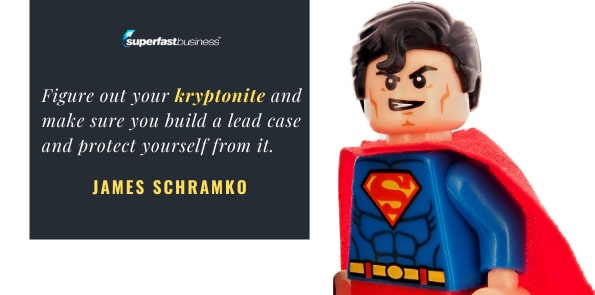 James: So it’s more or less like figuring out your kryptonite.
James: So it’s more or less like figuring out your kryptonite.
Rhonda: Yep.
James: And then making sure you build a lead case and protect yourself from it.
Rhonda: Yeah. And once you see it, you’ll see it. I mean, that’s what everyone says to me when they go, ‘Oh my god, I see. I know now why I went to college, quit college, married, got divorced,’ you know, every decision you’ve ever made that you beat yourself up for, you all of a sudden go, ‘Oh, now I get why I did that.’ So it becomes a blame. Just like melts blame and shame off you, you know? Just all that blame and shame and the past and, ‘Who do you think you are?’ And, ‘How dare you?’ Just literally melt off your back. And then you can feel yourself again, you can know the difference between you and your truth, right? And your freedom versus the you, driven by fear. And then you can start acting from that place.
James: I did spend a lot of time reflecting on my past and why things happened the way they happened. And I feel like I did connect with a lot of the cause. And I certainly agree. A lot of people are programmed by the time they’re five. Parents say stuff like, you know, the boogeyman under the bed will get you. All this sort of stuff. Or, you know, we can’t afford that. All these things are laid down and imprinted. And I liked that book, The Courage To Be Disliked, because that really hit on the belonging thing, like square on the nose. A lot of us, we do things so we’re accepted and to step out of line is, you know, a big fear for many people.
Rhonda: Yeah. Well, I want you to remember, our number one human need is connection and belonging.
James: Yeah.
Rhonda: And you know, the last what, three, five, 10 thousand years, if you didn’t belong to a tribe and you were out in the Congo, you were dead.
James: Yeah.
Rhonda: So connection and belonging is an embedded human need. But most of us get connection and belonging through what I call the wheel of fear, right? We, you know, feel desperate, we give too much, we get resentful. We promise too much, we underdeliver because we overpromise. And so now we’re in this cycle, and we’re trying, really trying to do the right thing. All the best intentions. Like, people have the best intentions, and they just can’t figure out why they keep getting tripped up. And that was my life. You know, my life after my horrific experience when I was 14. You know, for 20 years, I just couldn’t get past my past. And it was only understanding the wheel of fear and the wheel of freedom that I was able to get past my past. It was no longer that I’m wrong or bad or weak or stupid. It was, ah, okay, my wheel of fear is here to protect me, and I get to make a decision that I can actually move beyond that protection and actually be free.
James: Yeah, that really makes sense to me. I had something happen to me when I was about 12 or 13, and I wasn’t aware that it had an impact for me for many, many years. But then upon hindsight, you could see, well, that makes perfect sense. And then you can deconstruct it, but only when it’s visible. You know, when you remove the cloak of invisibility, you can deal with it.
Rhonda: That’s right. That’s right.
James: Go on.
Rhonda: I was just going to say, because that’s the key, and most of us blame ourselves. You know, take away that willingness to actually see the truth. And we just blame ourselves because we’re over-responsible. And you know, we want to be good people, and that includes blaming ourselves for everything that’s going wrong in our life. And we think that’s being responsible and accountable. But in fact, that’s actually not helpful. Right? So I always say, once you understand your wheel of fear, you won’t blame yourself anymore, because you’ll see your neurobiology is wired to do this, is wired to look at the past and repeat it. We are literally wired for that.
So you didn’t make a bad decision or a wrong decision, a stupid decision. You just made a decision because you weren’t awake to how you could make a decision. It was just roped, because that’s what’s worked for you in the past in some weird way, and proven to you that you are stupid, loser, weak, not good enough. Again, whatever word you call yourself, right? Whatever you label yourself as.
James: Fantastic. What are you going to be talking about at SuperFastBusiness Live, Rhonda? Because I don’t think you’re a loser, I think you’re a winner. I love your message. Every time I speak to you, which is, thankfully, I got to speak to you a fair bit in the last six months or so, I always learn something or I reflect on something in a different way. Because you’ve got such a body of information, there’s so much you could talk about. What’s going to be your message for our SuperFastBusiness Live audience?
Rhonda’s message at SuperFastBusiness Live 2020
Rhonda: Well, one of the things I’m going to talk about, of course, is fearless living, but one of the tools I’m going to give, which I think is really critical, is how to take risks and see your decisions differently. So most of us, you know, we get our to-do list, right? And we get one to 10, and I got to do these things. James says to do these things, right? And we do one, two, three, we skip four, do five, six, seven, skip eight and nine, right? And then we move four, eight and nine to the next day. And again, we skip them, we keep skipping them, we keep skipping them, and we’re like, what’s wrong with me? Why can’t I just do them? Well, I’m actually going to give you an exercise to break that whole mold so you can actually take the actions that are calling you so that you’re no longer going to be tricked.
So I’m going to basically put your to-do list on its ear and give you a whole new way to think about the stretch, risk or dies in your life, the things that you want to make happen in your life. So you’re going to have a different way to take action, a different way to think about it. And I think that is so critical. I have to say, it’s one of my favorite exercises. And it’s one that entrepreneurs just eat up for dinner, because they’re like, ‘Oh, you mean, I’m not dumb?’ I’m like, No, you’re not dumb. It’s just a stretch, risk or die. And let me show you how. So I’m going to definitely do the stretch, risk and die exercise.
And of course, I have other things up my sleeve, talking about entrepreneurship and small business and what it means and throwing in some money examples, etc. So I’m very much an interactive speaker. So we’re going to be doing things together. I’m not just going to be talking at you. You’re going to be taking notes, and you’re going to be doing things so that we can actually embody it more, so that when you walk out of SuperFastBusiness, you’re like, Oh, now I know what to do. Yes, you know what to do, and you know how to do it fearlessly.
James: I’m really intrigued by that. I don’t keep a to-do list anymore, but I would love to understand more about why there are some things that I resist more than others. And to be able to overcome that, I think, is worth attending alone. But I’ll definitely be there anyway since it is my event. I think that is something we can’t take for granted.
Rhonda: Kind of a given.
James: Yeah, it’s a given. I’ll be there. I’ll see you there, Rhonda. Thanks so much.
Rhonda: I’ll see you there. Thank you, James.
James: Yeah, thank you so much for sharing. Get over to FearlessLiving.org; check out the materials there. I think, Rhonda, you came to me, actually, through a referral, through a friend who spoke so highly of you. And everything that he said was true and more, and just such a bundle of positive energy but backed by neuroscience. So I think that’s just a perfect combo. Thank you so much for sharing.
Rhonda: Thank you, James. Thank you, James, such a joy. I can’t wait to see you in just a short time.
James: Yeah, and we’ll put this episode up. The transcription is available at Episode 718.
Benefit from other life and business lessons inside the JamesSchramko community
Meet Rhonda Britten and other world-class experts at SuperFastBusiness Live 2020. Grab your ticket here
Enjoyed the show? Access all our episodes by subscribing on iTunes
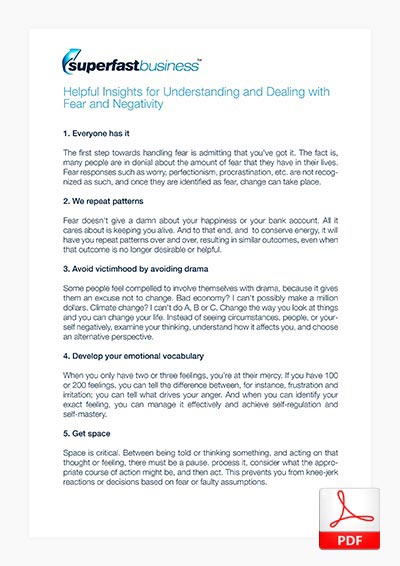

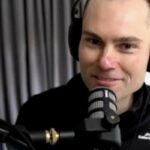
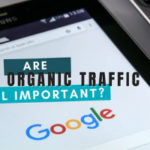
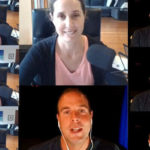





Leave a Reply